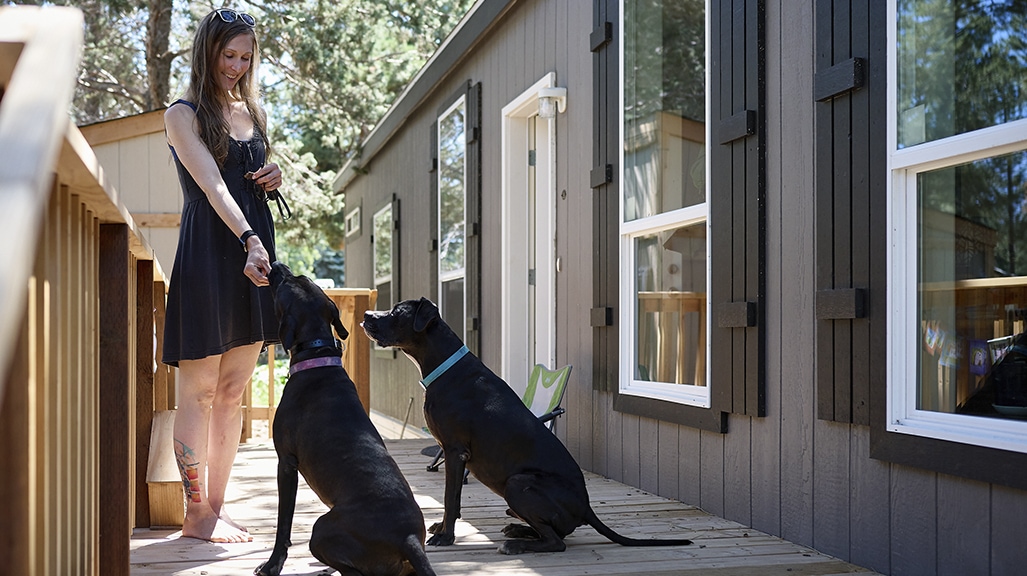Success Story
Bridging the gap to quality, efficient manufactured housing
Many Oregonians living in older manufactured homes struggle with high energy costs, spending up to 70% more on energy per square foot than residents of site-built homes, according to the U.S. Energy Information Administration.
Fortunately, Nadja Schmidt is no longer one of them.
Schmidt is the proud owner of a new energy-efficient manufactured home located in the West-Side Pines Cooperative in Bend. As the first homeowner to go through Energy Trust’s new Manufactured Home Replacement program, Schmidt’s home boasts features — including high-efficiency insulation, high-performance windows and energy-saving heating and cooling — that offer year-round comfort, lower monthly energy costs and healthier indoor air.
“I knew my quality of life would go way up when I made this decision,” said Schmidt. “A new, warm and energy-efficient place to live just sounded awesome. I feel fortunate, and I’m glad I did it.”
Schmidt’s new home is so attractive and comfortable it has generated a buzz throughout the West-Side Pines community, where two more owners have stepped forward to express interest in the replacement program.
The Manufactured Home Replacement program builds on the results and lessons from a four-year-long pilot offer. Working with state and local partners, Energy Trust helped replace nearly 50 manufactured homes that were built to outdated, inefficient energy standards.
“The need is so great that Energy Trust launched a permanent, statewide offer designed to meet the needs of moderate- to low-income residents, who often bear the greatest energy burden,” said Mark Wyman, Energy Trust residential senior program manager.
Individual customers or park owners can receive up to $16,000 from Energy Trust toward each home replaced. Energy Trust works with Oregon Housing and Community Services to help owners tap into additional funding, such as grants and forgivable loans. Our relationship with nonprofit lender Craft3 brings them low-interest financing — putting a home within reach of owners like Schmidt, who had two seasonal jobs.
For park owners and property managers, Energy Trust helps them leverage additional funding to replace multiple units at once. That’s what happened with Lucky 7, a manufactured home park owned and operated by the Confederated Tribes of the Umatilla Indian Reservation (CTUIR). After major flooding swept through Umatilla County, CTUIR and Energy Trust worked together to access Oregon Emergency Board disaster relief funding, enabling the tribe to replace older manufactured homes with 18 new high-efficiency models.
“We’re very fortunate to have a great partnership with Energy Trust,” said Marcus L. Luke II, housing director for CTUIR. “Lucky 7 needed an overhaul and we worked hand-in-hand to install the units, which are energy efficient, quality and affordable for our tenants — including several flood-impacted residents who were on our waiting list.”
Because replacing a manufactured home involves a myriad of decisions, Energy Trust offers a personal navigator to provide assistance at every step. Navigators help participants understand removal and siting requirements, review their options and reserve and secure funding. This is particularly useful in wildfire-affected communities, many of which include manufactured homes that provide affordable housing.
“In the 2020 wildfire, more than 300 manufactured homes were destroyed in the City of Talent alone,” said Wyman. “We’re seeing a lot of interest from wildfire survivors.”
